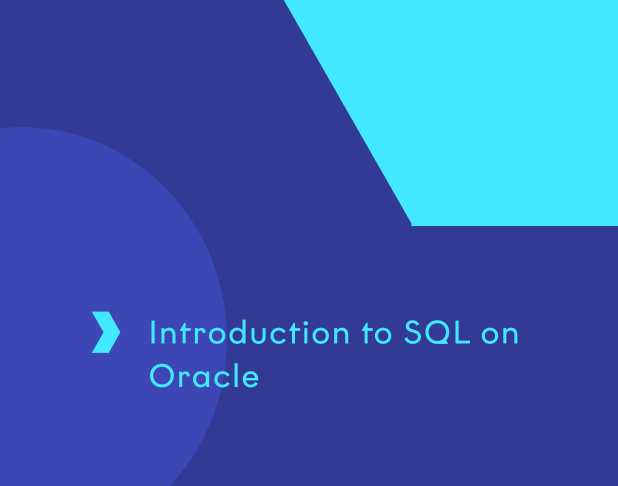Join ILX for an immersive, hands-on introduction to SQL within an Oracle environment. This one-day course guides you through the essential skills required to write SQL queries, explore relational structures, and manage data across supported Oracle versions including 12cR2, 18c and 19c.
Introduction to SQL on Oracle
Select your learning method

Build real-world Oracle SQL skills that enhance your technical knowledge
Our instructor-led course offers a practical exploration into the fundamentals of SQL using Oracle databases. Throughout this focused one-day course, you’ll develop essential knowledge around how to extract and work with data through structured queries to apply straight away in work environments.
- Retrieve data using SQL statements
- Use aggregate operations to summarise data
- Merge datasets from multiple sources
- Create and apply subqueries
- Perform operations with SQL set commands
- Interpret database architecture principles
- Navigate SQL Developer and SQL*Plus
- Organise data using filtering and sorting
What you’ll learn
Learn the essential SQL skills that help you work confidently with Oracle databases. Discover how to write queries, join and filter data, use functions and subqueries, and manage tables and views, giving you a strong foundation for ensuring effective reporting, analysis and database operations.
Joining Tables
Explore how to retrieve related information from multiple tables using inner, outer and self joins. You’ll work with table aliases and ANSI join syntax, learning how these techniques reveal relationships across datasets and allow you to construct meaningful queries that reflect real-world database structures.
Subqueries and Set Operators
Develop the ability to write subqueries that simplify complex questions and support advanced filtering. You’ll also learn how to combine and compare results with Oracle set operators, including UNION, INTERSECT and MINUS, gaining practical techniques to extend query power and deliver more insightful database analysis.
Working with SQL Files and Scripts
Understand how to manage SQL files and scripts efficiently. Learn to create, edit and execute scripts within SQL*Plus and SQL Developer, configure sessions with login.sql, and apply scripting methods that improve workflow, enable automation, and ensure queries are consistent across repeated tasks.
Practical Troubleshooting and Output Formatting
Discover how to troubleshoot Oracle SQL effectively by identifying syntax errors, invalid identifiers and common runtime issues. You’ll also explore formatting commands in SQL*Plus, including adjusting line size, page size and column layout, as well as exporting results into readable files for reporting and analysis.
- One-day of instructor-led training in a live virtual classroom
- Interactive hands-on live labs
- All relevant course materials
Key facts
Anyone entering a technical role needing a strong SQL foundation in Oracle.
No previous SQL experience needed. General IT awareness is useful but not essential.
Our experienced trainers and interactive labs create a focused, practical environment – so you can put theory into practice from day one.
FAQs
Our beginner-level course introduces SQL for Oracle users, providing a clear entry point into querying and database management. You’ll gain practical skills to retrieve and organise data, laying the foundation for stronger reporting, analytics and ongoing career development.
How are scripts used during training?
SQL scripts are introduced to help automate and repeat common tasks. You’ll learn how to create, save and re-execute scripts, reinforcing query structures during live lab practice. This approach not only strengthens understanding but also develops habits that improve accuracy and efficiency in real workplace environments.
Can this course help if I work in reporting?
Yes. The course equips you with SQL techniques for extracting, filtering and organising data effectively. By writing queries that generate accurate results, you’ll be able to support analytics teams, create meaningful reports and improve dashboards, giving stakeholders clearer insights for business decision-making and performance monitoring.
Will I learn about SQL Developer shortcuts?
Yes. SQL Developer features are included to help you work more efficiently. You’ll explore shortcuts such as tab navigation, query history and formatting tools. These techniques streamline your workflow, reduce repetitive tasks and ensure you can analyse and present Oracle SQL data more productively.
Can I use this course to better understand legacy systems?
Yes. The course covers SQL concepts that apply across different Oracle versions, including older systems. You’ll gain strategies for interpreting legacy scripts and adapting them to modern practices, helping you bridge the gap between outdated code and today’s database standards.
What our customers say

“Really informative course, structured to support all forms of learning and at a good pace.”

“Thoroughly enjoyed the course, very informative and a good balance between instruction and practical work.”
Join the half a million learners developing their skills with our training
A trusted partner to thousands of organisations worldwide
Our passionate team goes above and beyond to support customer needs
Please complete the form to ensure your quote is accurate and we will contact you soon.